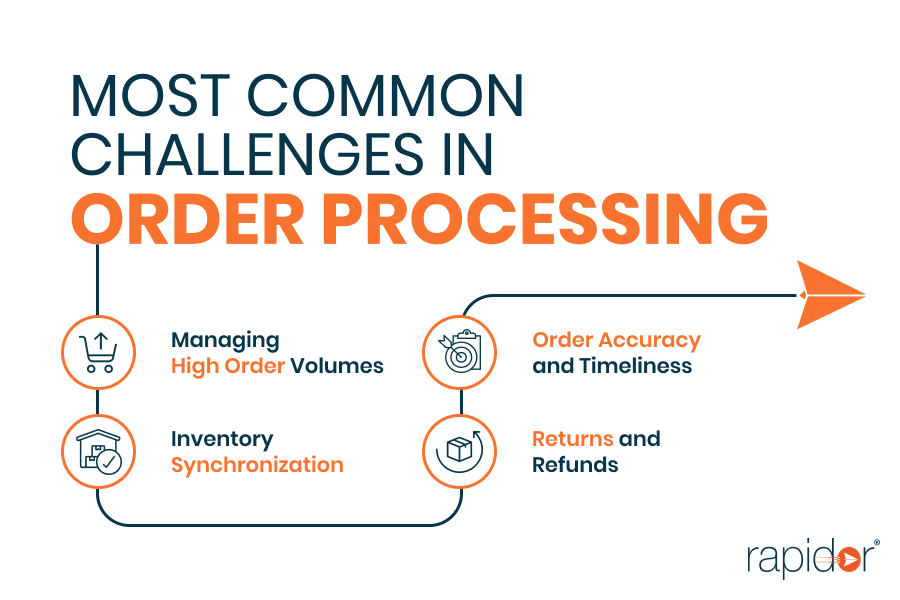The e-commerce landscape has witnessed an unprecedented boom, redefining how consumers shop and businesses operate. In this digital age, where convenience meets choice, the efficiency of order processing emerges as a cornerstone of online retail success. As we embark on a journey through the world of e-commerce order processing, it becomes clear that this intricate process holds the power to shape customer experiences, drive growth, and ultimately determine the fate of online businesses.
Significance of Efficient Order Processing
In the fast-paced realm of e-commerce, efficient order processing is more than just a backend operation—it’s a catalyst for customer satisfaction and business success. A seamless order processing journey translates to prompt order fulfillment, accurate deliveries, and satisfied customers. Such satisfaction not only fosters loyalty but also results in positive word-of-mouth, thus contributing to the growth trajectory of online retailers.
The correlation between efficient order processing and positive customer experiences cannot be overstated. When customers receive their orders accurately and on time, their trust in the brand deepens. This trust, in turn, transforms into repeat business and advocacy—a precious currency in the e-commerce landscape. Moreover, streamlined order processing optimizes resource allocation, reduces operational costs, and increases overall business efficiency.
In essence, the significance of efficient order processing transcends mere transactional efficiency—it’s the bedrock of a seamless customer journey and the key to unlocking sustained growth in the fiercely competitive world of online retail.

Challenges in Order Processing
While e-commerce offers unprecedented opportunities, it also presents unique challenges in the realm of order processing. Online retailers must navigate these challenges to ensure a frictionless customer experience.
Managing High Order Volumes
The surge in online shopping has led to a significant increase in order volumes. Managing this surge efficiently, especially during peak seasons, demands robust order processing systems that can handle large quantities without compromising accuracy or timeliness.
Inventory Synchronization
Maintaining real-time inventory accuracy across multiple platforms is a hurdle that online retailers must overcome. Discrepancies in stock levels can lead to stockouts or overstock situations, affecting both customer satisfaction and operational efficiency.
Order Accuracy and Timeliness
Ensuring that orders are fulfilled accurately and delivered on time is a constant challenge. Any discrepancies in order fulfilment or delivery timelines can lead to customer dissatisfaction and brand tarnishing.
Returns and Refunds
Managing returns and refunds adds another layer of complexity to order processing. Retailers must have efficient processes in place to handle returns seamlessly, manage refunds promptly, and minimize the impact on customer experience.
Navigating these challenges requires a strategic approach, innovative solutions, and a commitment to optimizing order processing workflows.
Best Practices for Optimal Order Processing
Navigating the complexities of e-commerce order processing requires the adoption of best practices that ensure efficiency, accuracy, and customer satisfaction.
Automation of Order Processing
Automation emerges as a game-changer in the realm of order processing. By automating manual tasks such as order entry, invoicing, and fulfilment, businesses can accelerate processes, reduce errors, and enhance overall efficiency. This allows teams to focus on high-value activities that require human intervention.
Integration of E-Commerce Platforms and ERP Systems
Seamless integration between e-commerce platforms and Enterprise Resource Planning (ERP) systems is critical. This integration facilitates real-time data sharing, streamlining processes, and ensuring accurate order fulfilment. It minimizes the chances of errors resulting from manual data entry.
Real-time Inventory Updates
Maintaining accurate and up-to-date inventory information is essential for efficient order processing. Real-time inventory updates enable businesses to prevent overselling, manage stock levels effectively, and fulfill orders without delays caused by stockouts.
Order Tracking and Communication
Proactive communication with customers about their order status enhances transparency and customer satisfaction. By providing real-time order tracking and regular updates, businesses empower customers to track their orders and plan accordingly.
Technologies Transforming Order Processing
The world of e-commerce is witnessing a technological revolution that is reshaping order processing and customer experiences.
AI-Powered Predictive Analytics
Artificial Intelligence (AI) is driving predictive analytics, allowing businesses to forecast order volumes and demand patterns accurately. This enables retailers to optimize inventory levels, reduce stockouts, and enhance overall supply chain efficiency.
Robotic Process Automation
Robotic Process Automation (RPA) is revolutionizing order processing by automating manual tasks. RPA bots can handle order data entry, invoice generation, and even coordinate with warehouses for order fulfillment. This eliminates human errors and accelerates order processing.
Blockchain for Transparency
Blockchain technology is enhancing transparency and security in supply chains, impacting order processing. By providing an immutable and transparent ledger of transactions, blockchain minimizes the risk of fraud and ensures the authenticity of products, benefiting both businesses and customers.
Future Trends in E-Commerce Order Processing
As the e-commerce landscape continues to evolve, future trends in order processing promise innovation and enhanced customer experiences.
Personalized Order Fulfilment
The trend of personalized order processing is gaining traction. Businesses are leveraging customer data to offer tailored order processing experiences. From customized packaging to delivery options aligned with individual preferences, personalization is set to redefine order fulfilment.
Sustainable Packaging Solutions
With environmental consciousness on the rise, sustainable packaging is becoming a focal point. E-commerce businesses are exploring eco-friendly packaging materials and practices that resonate with environmentally-conscious consumers.
Conclusion
The journey through the intricate world of e-commerce order processing underscores its pivotal role in shaping customer satisfaction and business success. Streamlined order processing not only drives operational efficiency but also enhances the customer experience, thereby fostering brand loyalty and growth.
As we conclude this exploration, it’s clear that e-commerce professionals must embrace best practices and leverage transformative technologies to optimize order processing workflows. By doing so, they can navigate challenges, seize opportunities, and ensure that the e-commerce boom translates into seamless customer journeys and thriving online businesses.
Frequently Asked Questions
What is order processing, and why is it crucial for online retail?
Order processing encompasses the end-to-end activities involved in receiving, validating, fulfilling, and delivering customer orders. It’s crucial for online retail as it directly impacts customer experiences, operational efficiency, and overall business success.
How can efficient order processing enhance customer satisfaction?
Efficient order processing ensures accurate, timely, and seamless order fulfillment. Customers who receive their orders promptly and as expected are more likely to have positive experiences, leading to higher satisfaction levels and repeat business.
What challenges do online retailers face in order processing?
Online retailers grapple with challenges such as managing high order volumes during peak periods, maintaining accurate inventory data, ensuring order accuracy and timeliness, and managing returns and refunds effectively.
What technologies are transforming the landscape of order processing?
Cutting-edge technologies like AI-powered predictive analytics, robotic process automation (RPA), and blockchain are transforming order processing. AI predicts demand patterns, RPA automates manual tasks, and blockchain enhances transparency and security in supply chains.


